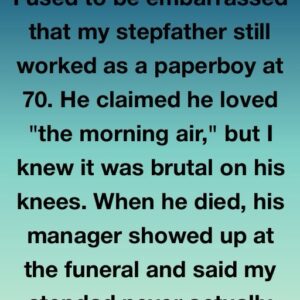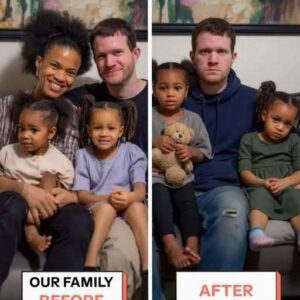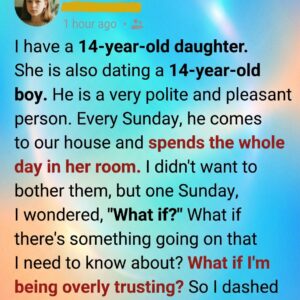The kitchen was dark, save for the weak light above the stove casting long, tired shadows on the cracked tiles.
Elena sat at the small table, hunched over, her eyes fixed on a faded photograph.
In it, her son Andrei beamed proudly in his graduation cap, eyes full of promise. He had just turned 22,
his dreams as wide as the sky—dreams now crushed beneath the weight of an unjust conviction.
Outside, the quiet night hummed with distant traffic and the occasional bark of a stray dog.
But inside the small house, it was utterly still. The only sound was the slow ticking of the wall clock, each second a reminder of the time slipping away, of opportunities lost.
Elena’s hands trembled as she brushed her thumb across the photo.
Her heart ached—not with ordinary sadness, but with a deep, suffocating helplessness. Today had changed everything.
Hours earlier, Andrei had stood before a judge, eyes wide and disbelieving, as the verdict was read: Guilty. Ten years. For a theft he didn’t commit.
The courtroom had been cold, sterile—deaf to truth, blind to the pain etched into his face. Elena had cried out, her voice trembling as she begged for a moment of reason. “He’s innocent!” she had screamed. But the gavel had already fallen.
The prosecution’s case had been a performance of lies. False witnesses. Fabricated evidence. Elena had watched it unfold with horror, powerless as her son was painted as a criminal. Andrei’s public defender had barely put up a fight. No one listened. No one cared.
Now he was behind bars. And she, his mother, was left with the knowledge that the world had failed him.
But Elena wasn’t the kind of woman who sat still while her family was torn apart.
Her thoughts raced as she stood from the table and moved toward the window, peering out into the night. A mother’s instinct wasn’t just to protect—it was to endure.
To carry the burdens too heavy for her children. Andrei had his whole life ahead of him. College plans. A future. Maybe even a family of his own someday. She couldn’t bear the thought of him wasting his youth in a prison cell.
“I’ll fix this,” she whispered aloud, the words surprising even herself. They carried no uncertainty. Only resolve.
She walked quietly into her bedroom and opened her closet, reaching for a small tin box hidden beneath a stack of old scarves. Inside was every important document she owned—and the one piece of evidence no one in court had seen: a receipt. Dated the night of the theft. With her name on it.
Elena had been at the market, picking up groceries, when the crime occurred. She hadn’t told the police, hadn’t even realized the receipt’s value until the trial was nearly over. And then… it had been too late. The defense had moved too quickly. The court had refused to reexamine.
But the receipt gave her an idea. If she could place herself at the scene—if she said she had committed the theft—she could overturn the conviction. She knew the law well enough to understand the risk. False confessions were dangerous. But truth hadn’t saved her son. Maybe a lie, if told with enough conviction, could.
That night, she barely slept. She stared at the ceiling, imagining Andrei in his cell. Cold. Afraid. Alone. Her heart broke again and again.
At dawn, Elena got dressed.
She wore a plain gray coat, her hair tied back tightly, her lips pressed into a determined line. She looked in the mirror one last time, not for vanity’s sake, but to memorize the face of the woman she was about to leave behind.
Then she picked up the receipt and walked out the door.
The police station was quiet at that hour, with only a few officers sipping coffee and shuffling paperwork. One looked up as Elena entered, a bit surprised.
“Can we help you, ma’am?” he asked.
Elena stood tall. Her voice was steady, her heart resolute.
“Yes,” she said. “I’m here to confess. I committed the theft.”
The room fell silent.
The officer blinked, unsure if he’d heard correctly. “You… what?”
“I’m the one who stole from the electronics store. My son is innocent.”
“You’re aware of the charges? The sentence?”
“I am,” she said calmly. “I’ve come to take responsibility.”
There was a moment of stunned silence, then a flurry of activity. Forms were pulled. A superior officer was called in. Questions were asked—over and over, as if the officers were hoping she’d change her story.
But Elena never wavered.
She told them what they needed to hear. That it had been a moment of desperation. That she had acted alone. That her son had only confessed out of fear.
By the time the sun rose high in the sky, Elena was in handcuffs.
As they led her down the corridor, past cold metal doors and grim stares, she didn’t cry. She didn’t plead.
Because this was her choice.
This was what a mother’s love looked like when pushed to its limits.
She whispered a silent promise to Andrei: Live your life. For both of us.
And then the door closed behind her.
Chapter 2: Behind the Iron Gate
The heavy clang of the prison doors echoed like thunder, each metal slam a chilling punctuation mark in Elena’s descent into a world she never imagined stepping into. Her wrists throbbed from the tightness of the cuffs, but she didn’t flinch. Her steps were slow but certain. With every corridor she walked down, she left behind a piece of the life she once knew.
In the intake area, they stripped her of everything: her clothes, her belongings, her name. She became Inmate #42389, another number in a system that valued protocol over people. Her hair was tied back tighter than she liked. Her clothes—a dull, gray jumpsuit that hung loosely off her shoulders—smelled of bleach and hopelessness.
“Sit,” barked a guard as she was led into processing. Elena did as she was told, folding her hands neatly in her lap. She looked around—cracked walls, flickering fluorescent lights, other women with hollow eyes and clenched jaws. This wasn’t a place for mothers. It wasn’t a place for anyone.
When the mugshot camera flashed, she kept her chin high. She wasn’t proud, but she wasn’t ashamed either. Not of why she was here.
Later that day, she was moved to her assigned block. Cell 27B. Her cellmate, Tanya, was a wiry woman with tattoos on her knuckles and eyes that looked far older than her forty-some years.
“You new?” Tanya asked, barely glancing up from her bunk.
Elena nodded. “First day.”
Tanya smirked. “You’ll hate it here.”
Elena gave a soft reply. “I already do.”
Prison was a world governed by different laws. Not just the rules written in the handbook, but the unspoken ones: who you spoke to, how long you looked at someone, when to keep your head down. Elena learned quickly. She wasn’t weak, but she wasn’t hardened either. She survived by observing, listening, keeping to herself.
She missed everything.
She missed the squeak of her old wooden floors. The warmth of her favorite wool sweater. The smell of stew simmering on the stove. But most of all, she missed Andrei.
She worried about him constantly. Was he okay? Was he safe? Did he still believe in himself?
Once a week, she was allowed to write letters. And write she did. Every Sunday, her hands trembling, Elena poured her soul into each page.
My dearest Andrei,
I hope this letter finds you well. I imagine the world outside is moving fast, but remember—there’s no rush to catch up. Just live. Live kindly. Live freely.
I’m okay. Don’t worry about me. The days are long, but I think of you every moment. You must promise me something: you’ll keep dreaming. Keep building the life we both know you deserve.
I love you more than you’ll ever understand.
Mom
Andrei never missed a response. His letters were shorter, filled with guilt, always ending with a plea.
I don’t deserve this, Mom. Please let me fix it. Let me turn myself in.
She never let him finish the thought. Her replies always made it clear: This was my choice. I don’t regret it. Your job is to live.
Occasionally, Andrei was allowed to visit. The first time, he came with sunken eyes and trembling hands, unable to meet her gaze.
When he saw her in that gray uniform, seated behind a scratched plexiglass divider, something in him cracked.
“I should be the one in there,” he whispered, tears streaking his face. “You shouldn’t have done this. I should have fought harder…”
Elena leaned forward, her voice firm. “No, Andrei. This isn’t your burden. I chose this. You don’t carry the guilt. You carry the future.”
“But I’m free because you’re not,” he said, shaking.
“You’re free because I believed you deserved to be,” she replied.
They touched hands through the divider. It wasn’t enough, but it was all they had.
As months passed into years, Elena endured. She was no longer the delicate woman who entered prison trembling with uncertainty. She became quiet steel—resilient, wise, yet still gentle beneath the hard edges.
She read every book the library offered. Taught other women how to write letters to their children. Learned how to sew and repaired tattered prison uniforms just to feel useful.
But even resilience has its shadows.
There were nights when she couldn’t sleep, haunted by doubts. What if she’d only delayed Andrei’s pain? What if the system found out she lied? What if the years passed and he forgot how much she loved him?
Those were the nights she’d cry silently into her pillow, clinging to the thought of the boy in the photo—the one with messy hair, crooked teeth, and a heart too big for this world.
She would whisper his name like a prayer: Andrei. My boy. My hope.
Then one morning, without warning, a guard came to her cell.
“Elena Petrescu,” he said, glancing at a clipboard. “You’ve got news.”
She rose slowly. “What kind of news?”
“You’re getting out. Two weeks from today.”
Elena’s breath caught in her throat. “What?”
“Sentence reduction. Case review. Something about new evidence. You’ve got a lawyer now—apparently someone’s been fighting on your behalf.”
She staggered back to her bunk, heart racing.
New evidence?
A lawyer?
Andrei.
It had to be him.
He was trying to right the wrong.
And for the first time in seven years, Elena allowed herself to imagine the world outside. Not with fear—but with hope.
Two weeks.
Fourteen days.
And she would be free.
Chapter 3: Freedom’s Edge
The next two weeks passed in a strange, suspended blur.
Elena counted the days silently—morning by morning, breath by breath. She dared not believe it fully, not yet. Not until the gates opened. Prison had taught her caution. Hope was a fragile thing here—something that had to be held gently, like a bird with injured wings.
Still, something stirred in her.
She found herself waking before the guards’ morning call. She folded her sheets perfectly. She whispered good morning to the sunbeams sneaking through the tiny cell window. Even Tanya, her cellmate, noticed the change.
“You’re smiling like someone who just won the lottery,” Tanya said one morning, squinting from her bunk.
“Not the lottery,” Elena replied softly, “just a second chance.”
Word had spread across the block. Whispers followed Elena in the hallways. Some women envied her. Others celebrated her quietly. A few asked what she’d do first.
“See my son,” she always answered.
They didn’t need more than that.
By her final day, the guards had processed her release papers, the standard exit protocols had been completed, and she was given her old clothes—still neatly folded, though they smelled of storage and time. When she stepped into the changing stall and peeled off the prison jumpsuit for the last time, she looked in the mirror and paused.
She looked older.
Her face was thinner, her eyes heavier.
But there was something else there too—something harder to define.
Resolve.
Outside the gates, the sky was unusually blue. Clouds drifted lazily, unconcerned with her story. She blinked as the sun hit her face—real, full sunlight, not filtered through bars or dusty windows.
She exhaled slowly, her first free breath in years.
And then, she saw him.
Andrei.
He stood near the parking lot, taller than she remembered, with broader shoulders and stubble on his chin. A man now, not the boy she had taken the fall for. He looked hesitant, almost afraid to move.
Elena dropped her bag.
And then they were running.
Their embrace wasn’t graceful. It was desperate, clumsy, tearful. Andrei crushed her to him, burying his face in her shoulder.
“Mom,” he sobbed, “I’m sorry. I’m so sorry.”
Elena cupped his face in her hands, searching his eyes. “You have nothing to be sorry for.”
“I should’ve stopped you. I should’ve taken the punishment. You suffered for me.”
“I chose it,” she whispered. “And I would again. You’re here. That’s all that matters.”
They stood like that for a long time, unmoving, while the world carried on around them. People came and went. Cars passed. But for Elena, this moment was everything.
Eventually, they drove home.
The town hadn’t changed much, though some storefronts were new and some of the sidewalks cracked in new places. Elena kept glancing out the window, taking it all in—the color of the trees, the chatter of children, the way sunlight danced through the car window like gold ribbons.
At the house—the same one she had left all those years ago—she stepped inside cautiously.
It smelled different. Cleaner. Freshly painted walls, a new rug in the living room. Andrei had taken care of it. He had kept it alive for her return.





